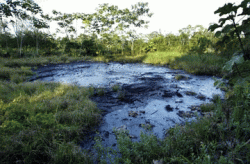
Sanctioned Chevron Lawyers Violating New Court Order in Ecuador Environmental Trial
Chevron Refusing to Pay Court Expert After He Found Contamination At “Remediated” Sites
Lago Agrio, Ecuador (November 30, 2010) – Chevron lawyers who were recently sanctioned for obstructing the Ecuador environmental trial where the company faces a potential $113 billion liability are defying yet another court order, according to court papers made available today.
Chevron is violating an order that it pay a $20,000 fee to a court-appointed expert requested by the oil giant to assess damages at eight Chevron well sites in Ecuador. Chevron faces the potential liability for causing what experts believe is the worst oil-related disaster on earth.
Chevron has admitted it discharged billions of gallons of toxic waste into Ecuador’s rainforest when it operated a large oil concession from 1964 to 1990. Evidence provided by the plaintiffs shows that an area the size of Rhode Island has been poisoned and several indigenous groups have been decimated.
In violation of court orders, Chevron’s lawyers are refusing to pay court expert Marcelo Munoz because his summaries of the scientific evidence from the Chevron well sites embarrassed the company by finding extensive contamination, according to lawyers for the plaintiffs.
Chevron’s refusal to pay the fees came after Chevron lawyers met alone with Munoz to persuade him to change his conclusions to favor the company and he refused, according to the court papers.
Chevron, which grosses about $200 billion annually, is refusing to pay an invoice of $20,000 to Munoz, according to the court papers.
“Chevron is engaged in obstructionism to slow down a trial it knows it is losing on the merits,” said Pablo Fajardo, the lead Ecuadorian lawyer on the case.
A court in Ecuador recently fined two Chevron lawyers in Ecuador, Diego Larrea and Alberto Racines, approximately $1,600 for obstructing the seven-year Ecuador trial by repeatedly filing the same motions. A third Chevron lawyer in Ecuador – Patricio Campuzano – was sanctioned in 2009 for the same reason.
In the United States, a federal magistrate judge in Colorado on Nov. 23 issued a clarifying order directing Chevron’s lawyers at Gibson Dunn & Crutcher to cease questioning during depositions that was described by the plaintiffs as “abusive and harassing”. The magistrate, Michael E. Hegarty, denied the plaintiff’s motion for a sanction requiring Chevron to pay funds to a local bar association to be used for training in how to conduct proper depositions.
The “abusive and harassing” questioning was conducted by Andrea Neuman, one of Chevron’s lead lawyers on the Ecuador matter and a partner at Gibson Dunn’s office in Irvine, CA. In their court papers, the Amazon communities had accused Neuman of using “blatant intimidation tactics” that “fall below the standards of professional conduct” required by Colorado and Federal rules.
In his clarifying order, Hegarty wrote that the court “granted the motion for sanctions to the extent the court sustained the objection to the line of questioning, but the Court denied the motion to the extent it sought sanctions.” The Amazon Defense Coalition had previously reported that its sanctions motion against Chevron had been granted based on an earlier order.
The lawsuit against Chevron originally was filed by the rainforest communities in 1993 in the United States, but it was shifted to Ecuador in 2002 at Chevron’s request after the company filed 14 separate affidavits attesting to the fairness of the Ecuador court system. More than 64,000 chemical sampling results produced in the trial point to extensive contamination at all of Chevron’s 378 former oil production facilities in Ecuador, according to the evidence.
Chevron’s abuse of the legal process has drawn increasing criticism.
An Ecuador Bishop who lived for years in the contaminated region, Gonzalez Lopez Maranon, blasted the oil giant for failing to accept responsibility for the “pollution and death” Texaco caused in the country. The comments were made in a letter sent by the Bishop to the U.S. Conference of Catholic Bishops.
Rep. James McGovern, the only member of Congress to visit the disaster area in Ecuador, previously had written a letter to President Obama saying Chevron’s pollution had created “a terrible humanitarian and environmental crisis.”
The contamination left by Chevron has plunged the region into a humanitarian crisis that has already resulted in numerous deaths from cancer, according to the plaintiffs.
